Have you ever wondered why some medications don’t seem to work as expected? It’s easy to assume that the medication is ineffective, expired, or even that the wrong prescription was given. But did you know that certain foods can actually interfere with the effectiveness of medications or even cause harmful side effects? It’s true! In this article, we will explore six common combinations of food and medication that you should avoid to ensure the best outcome for your health.
1. Bananas and Anti-Hypertensive Drugs

Bananas are known for their high potassium content, which is usually a good thing. However, if you are taking anti-hypertensive drugs to control your blood pressure, combining these medications with bananas can lead to an excess of potassium. This imbalance can cause irregular heartbeat, heart palpitations, and even conditions like arrhythmia. To protect your heart, it’s best to avoid this combination.
2. Vitamin C and Anti-Malaria Drugs
When treating malaria, it’s important to be cautious about your intake of Vitamin C-rich foods and supplements. The liver, where drugs are metabolized, contains a significant amount of iron. Vitamin C aids in the absorption of iron, which creates an excess of iron that malaria parasites thrive on. This surplus iron can counteract the effects of your anti-malaria medication. Therefore, it’s advisable to avoid citrus fruits or high-dose Vitamin C supplements while undergoing malaria treatment.
3. Painkillers and Soft Drinks
Do you enjoy a fizzy soft drink now and then? While it may be tempting to wash down your painkillers with a carbonated beverage, this combination can be dangerous. Soft drinks contain carbon dioxide, which dissolves in water under pressure. When consumed with painkillers, the carbon dioxide and acidity can increase the concentration of drugs in your blood, leading to potential toxicity. To stay safe, opt for plain water when taking painkillers.
4. Dairy Products and Antibiotics
Antibiotics are commonly prescribed to treat bacterial infections. However, if you consume dairy products, such as milk or cheese, at the same time as your antibiotics, the calcium in these foods can interfere with the absorption of the medication. This interference can reduce the effectiveness of antibiotics in fighting the infection. To ensure that your antibiotics work as intended, it’s best to avoid consuming dairy products around the time you take your medication.
5. Grapefruit and Statins
Statins are medications used to lower cholesterol levels. Unfortunately, like most drugs, they come with potential side effects. If you are taking statins, it’s important to avoid consuming grapefruit or grapefruit juice. Grapefruit contains a compound that inhibits the breakdown of statins in your intestines. This interference can cause higher levels of the drug in your system and increase the risk of experiencing side effects. To avoid complications, it’s best to steer clear of grapefruit while taking statins.
6. Leafy Vegetables and Anticoagulants
Anticoagulants, also known as blood thinners, are medications that slow down the blood clotting process. They are commonly used to prevent strokes and treat heart disease. Examples of anticoagulants include aspirin and warfarin. Leafy green vegetables, such as spinach and kale, are rich in Vitamin K, which promotes blood clotting. When you consume these vegetables while taking anticoagulants, it can counteract the effects of the medication. It’s important to carefully manage your intake of leafy greens while on these medications.
By being aware of these food and medication interactions, you can ensure that your treatments are as effective as possible. It’s always a good idea to consult with your healthcare provider or pharmacist if you have any concerns or questions about your specific medications and their interactions with food. While these combinations may seem surprising, a little knowledge can go a long way in safeguarding your health.





